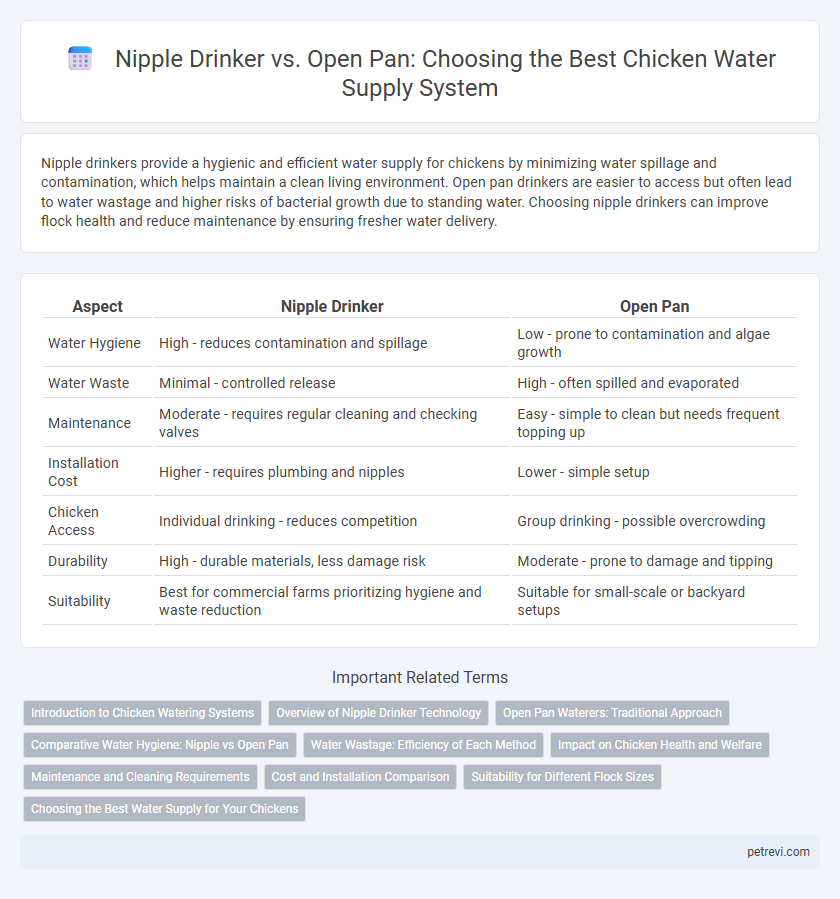Nipple drinkers provide a hygienic and efficient water supply for chickens by minimizing water spillage and contamination, which helps maintain a clean living environment. Open pan drinkers are easier to access but often lead to water wastage and higher risks of bacterial growth due to standing water. Choosing nipple drinkers can improve flock health and reduce maintenance by ensuring fresher water delivery.
Table of Comparison
| Aspect | Nipple Drinker | Open Pan |
|---|---|---|
| Water Hygiene | High - reduces contamination and spillage | Low - prone to contamination and algae growth |
| Water Waste | Minimal - controlled release | High - often spilled and evaporated |
| Maintenance | Moderate - requires regular cleaning and checking valves | Easy - simple to clean but needs frequent topping up |
| Installation Cost | Higher - requires plumbing and nipples | Lower - simple setup |
| Chicken Access | Individual drinking - reduces competition | Group drinking - possible overcrowding |
| Durability | High - durable materials, less damage risk | Moderate - prone to damage and tipping |
| Suitability | Best for commercial farms prioritizing hygiene and waste reduction | Suitable for small-scale or backyard setups |
Introduction to Chicken Watering Systems
Chicken watering systems are essential for maintaining poultry health and productivity by providing consistent access to clean water. Nipple drinkers reduce water spillage and contamination, promoting hygiene and minimizing waste, while open pan systems allow easy access but often result in increased water wastage and higher bacterial risks. Selecting an appropriate watering system impacts flock hydration, growth rates, and overall farm biosecurity.
Overview of Nipple Drinker Technology
Nipple drinker technology provides an efficient, hygienic water supply system for poultry by delivering water directly through an automatic, self-cleaning valve activated when chickens peck at the nipple. This system reduces water spillage and contamination compared to open pan drinkers, promoting better flock health and minimizing waste in poultry farming. Its design ensures consistent water availability while maintaining a cleaner environment, making it a preferred choice in modern commercial chicken production.
Open Pan Waterers: Traditional Approach
Open pan waterers offer chickens easy access to fresh water, promoting natural drinking behavior and reducing the risk of dehydration. These straightforward, cost-effective systems require regular maintenance to prevent contamination and algae growth, ensuring water quality. Despite their traditional design, open pans can be less efficient in minimizing spillage compared to nipple drinkers, potentially increasing water waste.
Comparative Water Hygiene: Nipple vs Open Pan
Nipple drinkers provide a more sanitary water supply than open pans by minimizing contamination from dirt, bedding, and feces, reducing the risk of bacterial growth and disease spread among chickens. Open pans often collect debris and stagnant water, creating a breeding ground for pathogens, which can negatively impact flock health and increase maintenance requirements. The closed design of nipple drinkers ensures cleaner water access, promoting better overall hygiene and poultry welfare.
Water Wastage: Efficiency of Each Method
Nipple drinkers significantly reduce water wastage in chicken water supply systems by delivering precise water amounts directly to birds, minimizing spillage and contamination. Open pan systems tend to have higher water wastage due to evaporation, spillage, and contamination from debris, leading to inefficient water use. Studies indicate that nipple drinkers can save up to 30% more water compared to open pans, enhancing overall water efficiency in poultry farming.
Impact on Chicken Health and Welfare
Nipple drinkers significantly reduce bacterial contamination compared to open pans, promoting better chicken health and minimizing the risk of disease. These systems offer cleaner, fresher water, which supports optimal hydration and improves welfare by encouraging natural pecking behavior without excess spillage. Conversely, open pans increase water spillage, leading to wet litter conditions that can cause footpad dermatitis and higher ammonia levels, negatively impacting bird welfare.
Maintenance and Cleaning Requirements
Nipple drinkers require less frequent cleaning compared to open pans, as they minimize water spillage and contamination from chicken droppings, reducing bacterial growth in the water supply. Open pans demand daily cleaning to prevent algae buildup and disease transmission due to stagnant water and debris accumulation. Maintenance of nipple drinkers includes regular inspection for blockages and leaks, while open pans need constant refilling and scrubbing to ensure water quality and poultry health.
Cost and Installation Comparison
Nipple drinkers generally have a higher initial cost but offer better long-term savings by reducing water waste and contamination compared to open pans, which are less expensive upfront but prone to spillage and frequent cleaning. Installation of nipple drinkers requires more precise plumbing and setup, increasing labor time and complexity, whereas open pans are simpler and quicker to install with minimal infrastructure. Choosing nipple drinkers supports better hygiene and lowers maintenance costs despite the higher starting expense, making them a cost-effective solution for commercial poultry operations.
Suitability for Different Flock Sizes
Nipple drinkers offer precise water delivery, reducing spillage and contamination, making them ideal for large-scale commercial chicken flocks, typically exceeding 500 birds. Open pan systems provide easy access to water, suitable for smaller flocks under 100 birds, but they require frequent cleaning and can lead to higher water wastage. The choice between nipple drinkers and open pans significantly impacts flock hydration efficiency and overall poultry health management depending on the flock size.
Choosing the Best Water Supply for Your Chickens
Nipple drinkers provide a clean, spill-free water source that reduces the risk of bacterial contamination compared to open pans, promoting better chicken health. Open pans offer easy access for chickens but require frequent cleaning to prevent water contamination and wet bedding, which can lead to respiratory issues. Selecting the best water supply hinges on balancing hygiene maintenance, ease of use, and the specific needs of your flock size and environment.
Nipple Drinker vs Open Pan for Chicken Water Supply Infographic

 petrevi.com
petrevi.com